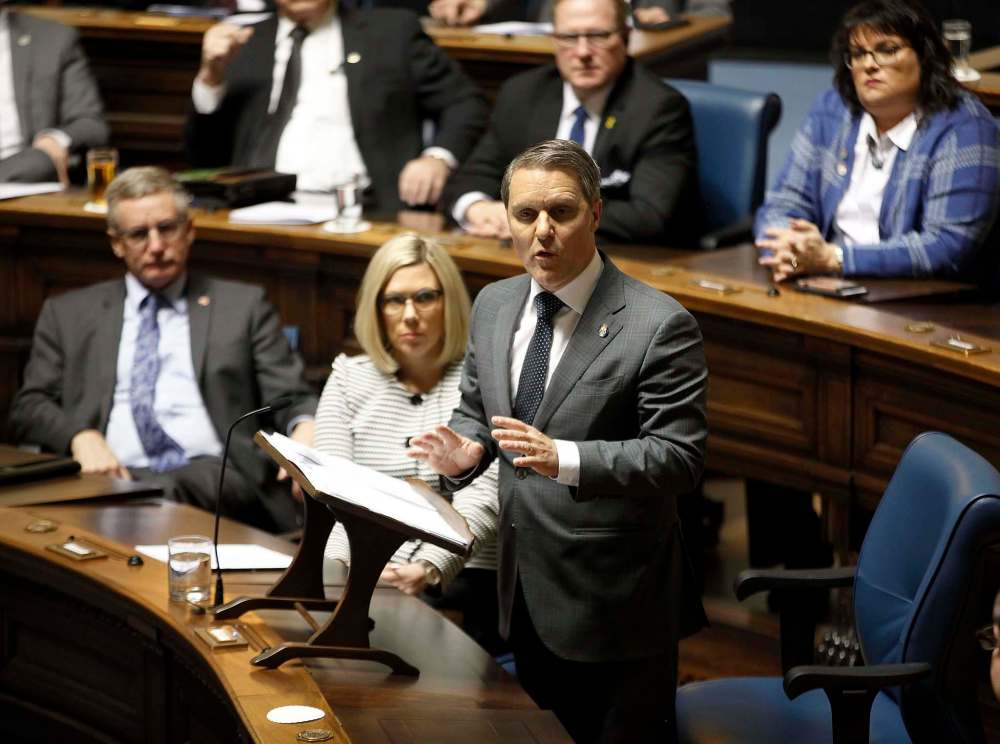Friesen’s sleight-of-hand deftly delivered
Advertisement
Read this article for free:
or
Already have an account? Log in here »
To continue reading, please subscribe:
Monthly Digital Subscription
$1 per week for 24 weeks*
- Enjoy unlimited reading on winnipegfreepress.com
- Read the E-Edition, our digital replica newspaper
- Access News Break, our award-winning app
- Play interactive puzzles
*Billed as $4.00 plus GST every four weeks. After 24 weeks, price increases to the regular rate of $19.00 plus GST every four weeks. Offer available to new and qualified returning subscribers only. Cancel any time.
Monthly Digital Subscription
$4.75/week*
- Enjoy unlimited reading on winnipegfreepress.com
- Read the E-Edition, our digital replica newspaper
- Access News Break, our award-winning app
- Play interactive puzzles
*Billed as $19 plus GST every four weeks. Cancel any time.
To continue reading, please subscribe:
Add Free Press access to your Brandon Sun subscription for only an additional
$1 for the first 4 weeks*
*Your next subscription payment will increase by $1.00 and you will be charged $16.99 plus GST for four weeks. After four weeks, your payment will increase to $23.99 plus GST every four weeks.
Read unlimited articles for free today:
or
Already have an account? Log in here »
Hey there, time traveller!
This article was published 14/03/2018 (2766 days ago), so information in it may no longer be current.
No one ever says anything nice about smoke and mirrors.
Those who employ them in their trade — for prestidigitational purposes, mostly — are dismissed as deceptive and accused of trying to portray things as something other than what they really are.
But when they’re used adeptly, they can also create an effect that leaves observers sufficiently satisfied by what they’ve seen that they don’t much care about the misdirection involved in the deft-handed delivery.

As smoke-and-mirrors routines go, Monday’s delivery of Manitoba’s 2018 provincial budget was a credit-worthy feat.
The man in the spotlight, Finance Minister Cameron Friesen, unveiled the Pallister government’s latest financial blueprint with the confidence and polish of a performer fully in command of his craft.
Mr. Friesen’s presentation was highlighted by announcements of tax cuts — both for individuals, through a series of increases to the basic personal-income exemption, and for businesses, by raising the income threshold for small businesses from $450,000 to $500,000 — and the revelation that the province’s belt-tightening measures have produced a better fiscal outcome than anticipated, with a reported budget shortfall of $726 million for 2017-18, rather than the $840 million originally forecast.
The Progressive Conservatives’ third budget since taking power in 2016 also offered a few minor spending increases, in particular in the areas of health care, education, families and justice, but the amounts become difficult to discern when such items as inflation and population growth are factored into the equation.
Overall, however, Monday’s stay-the-course budget announcement was of the sort that a dyed-in-the-blue-wool conservative could be proud.
What made the relatively rosy picture possible — and what Mr. Friesen and Premier Brian Pallister are less inclined to trumpet quite so loudly — are the combined financial benefits of an increased federal-transfer windfall and the pending arrival of newfound carbon-tax revenues.
Thanks to an improved economic performance in Canada’s “have” provinces — most notably Ontario — Manitoba is expected to receive $301 million more in transfers in the coming budget year than it did in 2017-18.
The launch of the federal government’s carbon-tax initiative on Sept. 1 is expected to add $143 million to Manitoba’s bottom line for this fiscal year and $248 million annually on a going-forward basis.
The new tax will add about five cents to the price of a litre of gasoline and the overall impact of new carbon pricing on an average Manitoba household will be about $300 annually.
The province did not unveil any specific carbon-reduction measures related to the new federally imposed initiative, but Mr. Friesen vowed that every penny (and more) of carbon-tax revenues will eventually be returned to Manitoba taxpayers.
In delivering the budget document, Mr. Friesen inaccurately described the upcoming changes as “the largest tax cut in Manitoba history.” That claim, of course, was pure showmanship, the sort of fast-talking banter one expects to hear — and mostly ignore — while a sleight-of-hand act is being performed.
As for the performance itself, Mr. Friesen was admirably focused and deliberate in his delivery, a marked improvement over his previous budget unveilings. As such, there were few gasps — amazed, outraged, awestruck or otherwise — to be heard from those who took in the presentation.
Smoke and mirrors aside, most who saw it likely came away thinking it was a reasonably convincing show.



